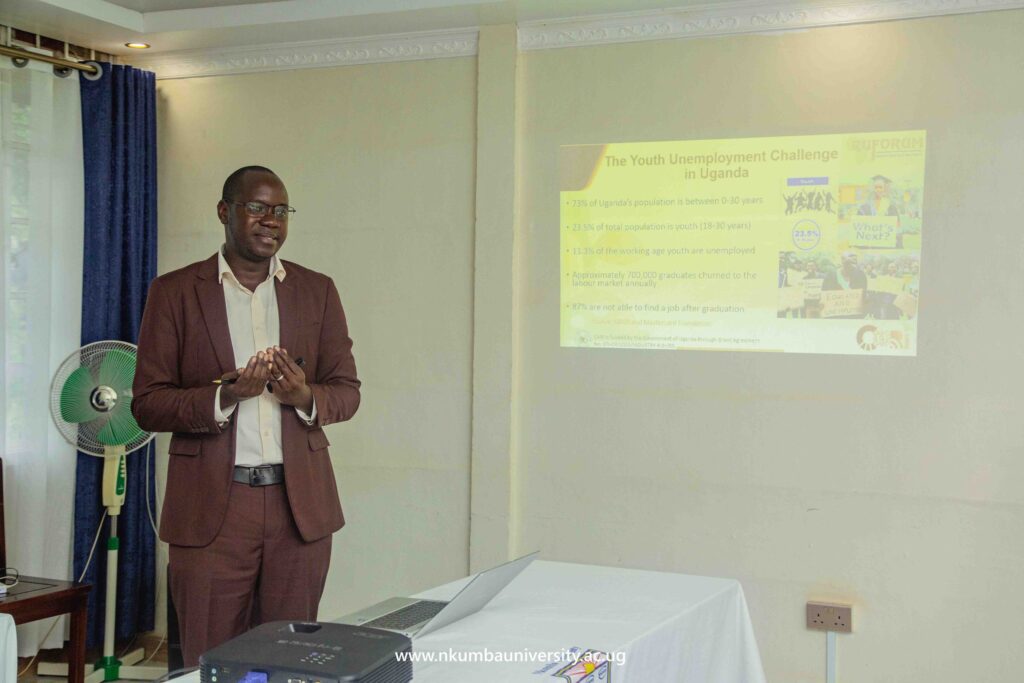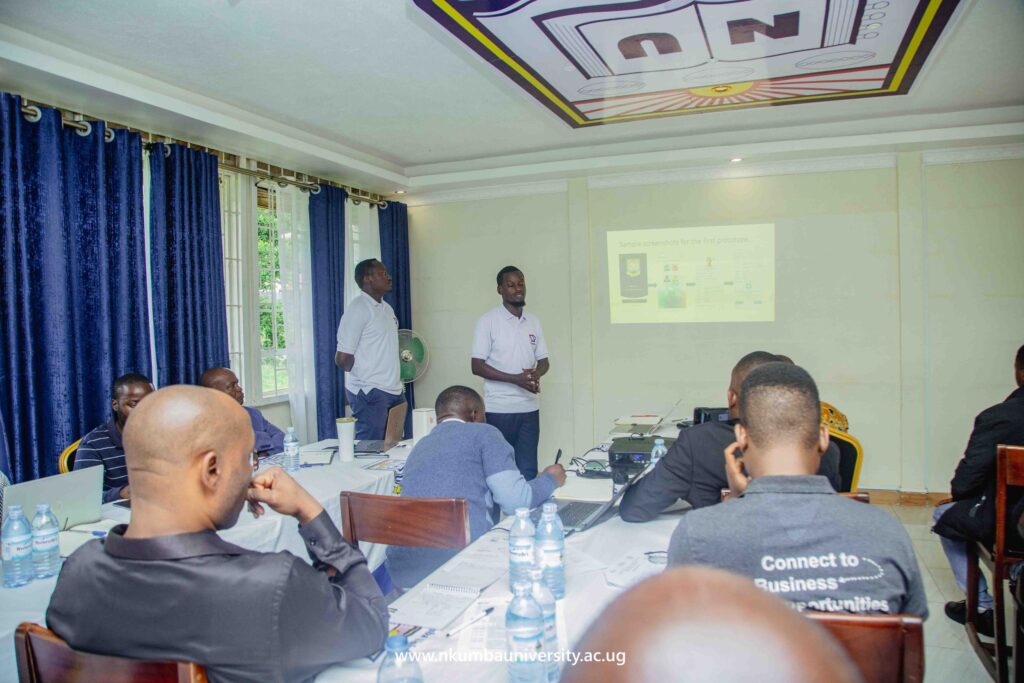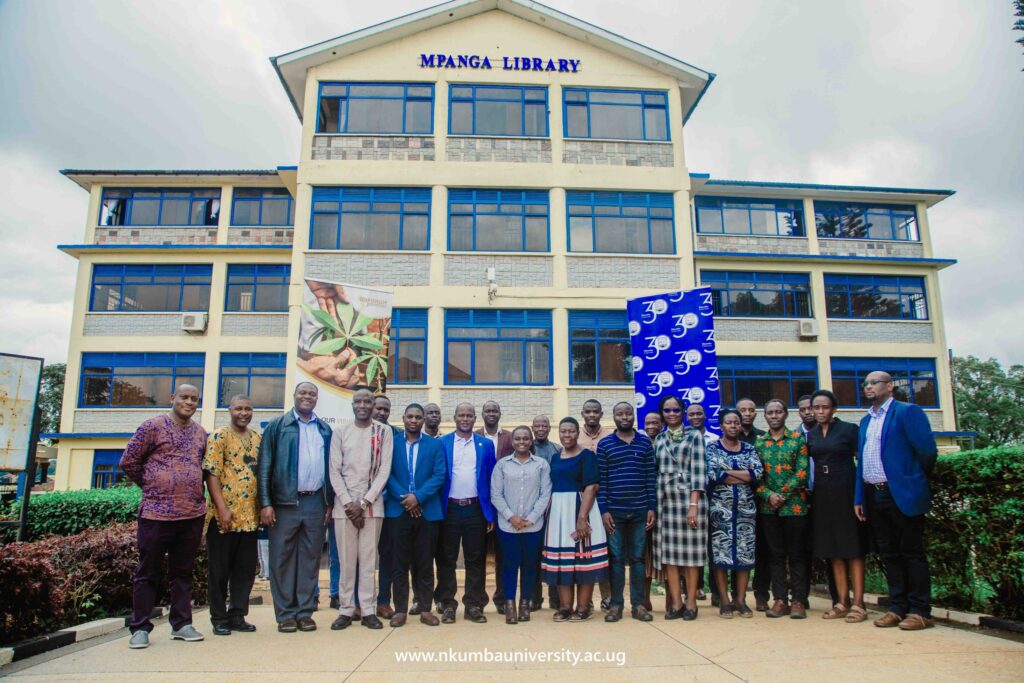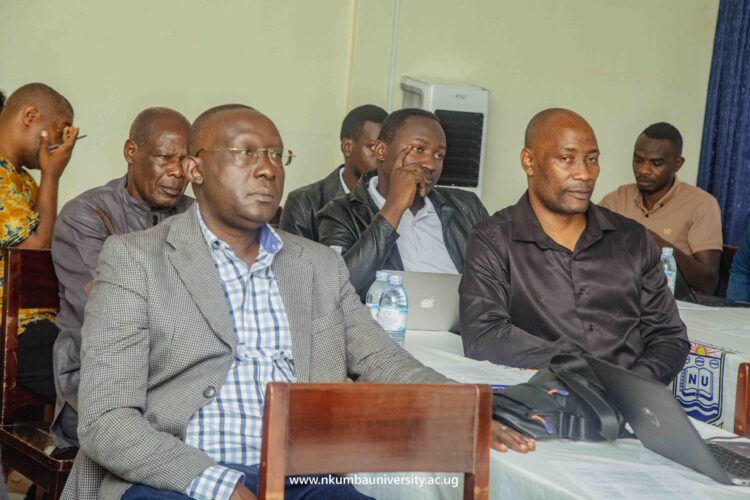Nkumba University hosted a high-level seminar on the Commercialization of Academic Research on Friday, 30th May 2025, facilitated by the Regional Universities Forum for Capacity Building in Agriculture (RUFORUM) and the Centre for Applied Research and Innovation (CARI).
The engagement, which drew scholars, entrepreneurs, innovators, and university administrators from across the country, focused on how academic research can drive economic transformation through structured commercialization and industry partnerships.
In his opening remarks, Nkumba University Vice Chancellor, Prof. Jude Lubega, acknowledged that “Any form of knowledge can be transformed into a commercial product; you just need the right bridge between science and application.” This informed the discussions.
Discussions focused on the Office of the President’s Science, Technology, and Innovation (STI-OP) strategy, its role in facilitating university-industry partnerships, and creating a supportive national environment. Key topics included Intellectual Property Management policies, guidelines, and their impact on commercializing academic research outputs.
Participants explored real-life examples, sharing ideas from psychometric tools in social sciences to embedded technology in agriculture.
RUFORUM’s Emmanuel Okalani highlighted global examples like the Massachusetts Institute of Technology (MIT) as models for structured research commercialization. He urged African universities to adopt frameworks such as technology transfer offices and IP protection policies.
“Universities like MIT have made billions because they created systems, technology scouts, industry linkages, and licensing offices. MIT didn’t start off profitable, they invested first. Sometimes you incur losses initially, but a single breakthrough technology can earn millions in return. We must emulate this,” he explained.
He also noted that RUFORUM is ready to facilitate partnerships between universities and international institutions to build capacity for knowledge commercialization.

The seminar featured insights from representatives of the Uganda Registration Services Bureau (URSB), who underscored the importance of intellectual property protection, technology transfer offices, and industry partnerships in making commercialization viable.
Key on the Agenda was showcasing the student-led innovations that are already making an impact. A team led by Mackenzie Tuhirirwe from Mbarara University of Science and Technology developed the Virtual Lab, a virtual electronics prototyping platform that allows students to simulate complex wiring and programming processes remotely. The innovation addresses the lack of equipment in engineering courses and reduces costs for universities and students. “We had 80 students and only two kits. We needed a way to teach embedded systems without expensive physical resources. So we built a virtual lab,” Tuhirirwe said, adding that students can write code, simulate circuits, and even generate printable circuit boards through the platform.
Ainembabazi Samantha and her team introduced Freza Nanotech, a biodegradable packaging and nanotechnology-based stickers that extend the shelf life of fruits and vegetables by up to 60 days, tackling the estimated 40% post-harvest loss in Uganda’s agriculture sector, accounting for over $4 billion annually. “We’ve developed biodegradable nano-packaging and stickers that extend the shelf life of produce by up to 30 days for tomatoes and 60 days for apples,” says Samantha, a co-founder.
The team extracts organic compounds from crops like cassava to create edible, eco-friendly packaging, providing both value addition for farmers and safe alternatives to conventional chemicals that can pose health risks.
“We are not just reducing waste, we’re creating value. Our materials are biodegradable, edible, and even made from crop extracts, returning value to farmers,” said Gift Mugisha.

Akampereza Darlington and his team from Nkumba University developed Tredumo to digitize university operations. In his presentation, Darlington showcased a fully integrated university management system, handling everything from admissions and course registration to biometric attendance tracking and student ID recognition-based classroom monitoring.
“We started by solving the long queues at university gates. Now we have a fully functioning system with modules for results management, online voting, counselling access, and even AI-powered identity verification,” said Akampereza Darlington, the team lead.
Tredumo is the Nkumba University innovation, incubated under the guidance of the Vice Chancellor, Prof. Jude Lubega an ICT expert.
In his supplement, Prof. Lubega emphasized the need for interdisciplinary collaboration, where social scientists, engineers, educators, and business minds work together. “We must break the silos. The problems we are solving are not just technical, they are social, cultural, and economic,” he added.
One major concern echoed by several speakers was the lack of connection between university research and government projects. Despite running large-scale programs in agriculture and education, the government is yet to tap into many local innovations. “We are innovating in isolation,” Dr. Noah Ssendaula lamented. “Universities, ministries, and innovators must talk. The government should be our first customer. They’re the biggest spender.”
There were calls to introduce local content policies that prioritize home-grown solutions in sectors like oil, gas, and mining.
Several presenters cited validation costs as major hurdles, especially for technologies requiring field trials. Others mentioned challenges like import duties on electronic components, high transaction costs, and a lack of infrastructure for tech testing.
“We’re proposing tax holidays and government guarantees to support early-stage innovations,” suggested Mackenzie, citing the need for policy reforms to ease commercialization.
The event concluded with a commitment from Nkumba University to establish innovation-focused support systems, including a dedicated office to coordinate research commercialization.
“This isn’t just a seminar, it’s a catalyst,” said Prof. Lubega. “We’re ready to move forward, to become not just consumers of knowledge but creators of marketable solutions.”
With optimism running high and collaborations forming across disciplines, the CARI–RUFORUM seminar marked a turning point in how Ugandan universities will perceive and pursue the commercialization of knowledge.























Discussion about this post